 |
||
| . . . Chronicles . . . Topics . . . Repress . . . RSS . . . Loglist . . . | ||
|
|
| . . . 2002-12-24 |
 |
The Weeds of Crime: Three Men on a Horse |
Synopses: A sissy in a mutally adoring marriage who's threatened by masculine hostility and a job crisis can solve all his problems by joining a bunch of gangsters.
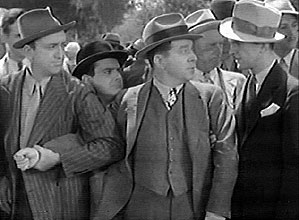 More mugs than you can shake an ugly stick at |
Three Men on a Horse trampled Broadway in 1935, and has been trotted out for summer stock, amateur theatricals, and sit-com rip-offs ever since.
Handed such a slab of certified Grade-A merchandise, Hollywood took the rare and unadvisable step of adapting it closely -- that is, barely.
As with Too Many Girls, there's some documentary interest in getting an unadulterated look at 1930s theater, complete with original cast members, original bathroom and easy virtue gags, and even original sets. But Too Many Girls had Rogers & Hart & lunacy on its side, and it quickly becomes apparent that the art of the legitimate "well-constructed" comedy hasn't declined nearly as much as the art of the musical. The talkies were better than plays pretty much right away. |
Stuck in our expensive seats, we pause for laugh lines, we pause even longer for forced laugh lines, we check our watch when it's time for intermission, and the cinematographer's snore goes almost entirely uninterrupted. (Or, as the IMDB reviewer puts it, "Throw a few special effects in and the movie would be a real winner.")
Well, actors enjoy plays even if cameras don't: Sam Levene is easier to take as a negligent criminal than as his usual negligent cop; worrying about her Erwin "lying in some hospital sick, or the back of some drug store," Carol Hughes ditzes with the best of them (where the best of them, as we'll see, is Una Merkel); Frank McHugh discards his usual cynical-idiot bray for unshakable dignity and becomes a surprisingly touching poet-hero. I didn't know he had it in him.
Nor did I know that Joan Blondell had that voice in her; nor did I want to. (Virtue is easy; accents are hard.) Blondell putting on a fake New York accent is as disturbing as me putting on a fake Groucho nose. It says something about the difference between acting and movie acting that she's the least professional aspect of the film and figures in its only moment of visual interest: a bizarrely interpolated upside-down glamor shot explaining why she's draped across the hero's legs.
And -- "'Cause I'm just crazy about poetry. That's why." -- she also initiates the kind of exchange a guy wouldn't mind on his tombstone:
"You're kind of nice, do you know it, Erwin?" |
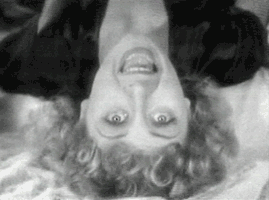 "I'm dizzy, Patsy." |
| . . . 2002-12-26 |
| The Weeds of Crime: |
 |
Baby Face Harrington |
 "Watch me. I'm going to be dynamic. Hey hey!" |
I've never particularly welcomed Butterworth's appearance in a film. He seemed to hobble progress: the camera positioned itself, eager for amusement, waited, faltered, and finally, baffled, moved on. Now I understand the deadlock: Butterworth is as out of place in someone else's movie as a Larry Eigner lyric would be in a paragraph of a techno-thriller, as out of place as an inventor in a Restoration court.
Like his friend Robert Benchley, Butterworth didn't offer a collection of jokes but a critique of consciousness. Where Benchley is driven and betrayed by articulation's social component, Butterworth drifts and dogpaddles into wistfully meditative isolation. Refusing to let go of anything and unable to maintain focus to any conclusion, he clings to blooming buzzing confusion, the material world looming in and out of the fog as idealized promise and as incomprehensible threat. He's certain that a speeding train will let him pass once he's signaled a left turn, and yet he's possibly the only man ever to be physically menaced by Donald Meek.
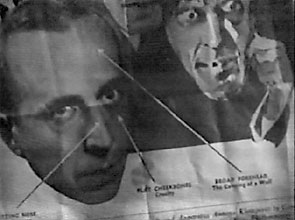 "This fella says I got a split personality." "Oh, you mean a sissy." "No; it's a term used by psychiatrists." |
"I also imitate birds. Purposefully."Similarly, any movie might take pleasure in the sight of Una Merkel with a gun; the scene only becomes Butterworthy as she dreamily begins to use it to smooth her beloved's hair.
Although director Raoul Walsh didn't find this assignment worth mentioning in memoirs or interviews, he soldiers manfully through slow parts good and bad, and although cinematographer Oliver T. Marsh may have thought it a bit of a let-down compared to his other MGM jobs that year (A Tale of Two Cities, David Copperfield, and Lubitsch's The Merry Widow), he provides an appropriately dim look, especially striking in the movie's most extended sequence, a suicide attempt:
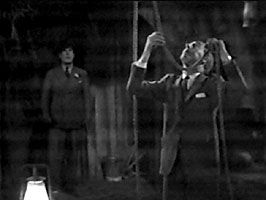 |
 |
 "Would you care to dance?" "If you do." "Well, I do if you do." |
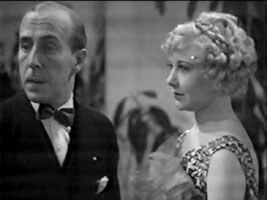 "Well, I do if you -- Willie, do you know you haven't kissed me yet?" "... In front of all these people?" "I will if you will." |
 "....... Let's go home." |
A sissy in a mutally adoring marriage who's threatened by masculine hostility and a job crisis can solve all his problems by joining a bunch of gangsters....
Public-minded citizens may wonder at the effect of such a message. Who knows how many crimes were incited and souls degraded before Hollywood finally got around to acknowledging a possible downside to that formula, twenty years later?
| . . . 2003-05-23 |
| The Weeds of Crime: The Killer Is Loose |
 |
As we've seen, when lover and livelihood are simultaneously threatened, a member of my tribe (wimp, weirdo, faggot, loser, milquetoast, hennetaster -- meaning no disrespect to our sisters, the bluestocking skags) typically vanishes beneath the sulfuric waters of passibly organized crime, and typically surfaces reeking, rosy, and restored to romance and respectability.
And the love of a peculiar woman being their only earthly attachment, should that attachment be snipped by Atropos, what would happen to our drifting, bobbing, squeaking gasbags?
Erwin Trowbridge, fortunate beloved of Carol Hughes and Joan Blondell and the Muse, might, as poet, guzzle deep and rev up on his (or more precisely her) tragedy, bansheeing a new Hallmark line: "So you've finally gone to Hell!", "Congratulations, you're in Purgatory!", and so on.
Willie Harrington might very well never notice any change at all, hauling Una Merkel from room to shabby room, asking if she'd like more tea, ducking his head in shame, perhaps absent-mindedly stuffing her with sawdust some Sunday afternoon....
 |
But if our hero was a little less buoyant, a little emptier, a little limper by nature or breeding?
Having had his dripping round snout so forced down and wriggled into the material and social essence of the world, mightn't he enter into a more direct engagement with it, to the benefit of all parties? |
|
| "You don't know how important that is. It's the difference between being dead and being alive." |
| . . . 2003-06-04 |
 |
 |
|
| From its opening shot, the film captures America's new strip-mall look: flat, carpeted, stuccoed and plate-glassed; dull and glaring; perfumed by air-conditioning and tainted from birth. | But down these bright sidewalks a man must go who is not himself bright, who is neither varnished nor unfrayed.... |
 |
Take any setting, no matter how tidy, and any guy, no matter how timid, and let the guy get disheveled enough, and you get a creepy scene.
Eyes cling, story shudders.
And once creeped by the crumbled surface, unbroken surfaces turn creepy too: the sullen bus, the locked liquor store, the oblivious taxi, the television betraying or blackened, even a bottle of cold refreshing milk -- as if we can only expiate the sin of having acknowledged the pariah by becoming equally invisible and powerless. But who's creeping who in this scenario? Cinematographer Lucien Ballard, master of sweat and stubble; director Budd Boetticher, big bullfighter on campus -- these are tough guys, right? |
Even while we're intimately learning (and re-learning, each time we're pissed on) its arbitrary and gang-erected nature, we're also taught to believe that manliness is a matter of balls: supposedly innate (although externalized) and readily apparent (although hidden). And wimp-made-good stories like Harold Lloyd's or Jim Carrey's reassure us: the other ball drops; the worm turns and stands up straight and tall....
|
What's more-or-less-comically threatening about these three stories is that their protagonists don't grow -- no, not even by two inches. And no matter what the fella says, they aren't "split personalities" either.
They remain hermetically themselves. It's merely a change of setting that makes the world reassess their jewels.
That's a message which macho scions of the bourgeoisie like Raoul Walsh and Boetticher might find perturbing. And so it's not surprising that Boetticher fans don't talk much about The Killer Is Loose, and it's not surprising that it's his best film. |
 |
| . . . 2003-06-07 |
Wendell Corey abraded 1950s Hollywood like an imperious acne-scarred iguana: outstandingly inexplicable as The Furies' love interest -- Barbara Stanwyck should've spent more time studying that copy of Are Snakes Necessary? -- and delivering his Rear Window banter with such open contempt that I half-expected him to try to pin the murder on Jeffries's little trollop.
But Corey also landed at least two parts perfectly suited to his Republican alienation from the species: "Smiley" Coy and Leon Poole.
 "I don't know why you'd do such a thing." |
I'd say Corey's Poole was as indelible a performance as Perkins's Norman Bates or Hopkins's Hannibal Lecter, except that no one seems to remember it. It certainly seems more realistic (although I've only met, that I know of, one mad killer myself), much more someone about whom you'd say, "He always seemed like such a nice man" and still never want to befriend or even stand very close to.
My shame to admit it, I probably wouldn't have gotten palsy with John Payne or Tom Neal, either. As Juliet Clark pointed out to me, Poole is a film noir hero in a film noir villain's role. The Killer Is Loose crossbreeds three strains of thriller (with a suggestion of the big heist film in the background):
"Even the island boys, they'd say Corporal Foggy, he get lost again, he forget his rifle."
"Yes, I remember."
 "Yes, I remember." |
Thus for the military. That other masculine bureaucracy, the police department, is equally dismissive:
"Worked himself into quite a stew, hasn't he?"We want Poole to prove his worth and show up the bullies, ideally without undue show of ego, just as part of the dirty job what a man's gotta do....
"Scared amateur -- bolted inside."
"Don't you see how wrong it was to do that?Which he does, kind of. Like later comic hero Travis Bickle would thwart the villains and get the girl, kind of.
I'm certainly going to settle with you for it."
"You said he wasn't crazy!"
 "What's more, you've demonstrated an earnest and sincere intention to pay your debt." "I've tried to follow the rules, sir." |
Although Poole remains self-possessed and hard-working, the clear-headed dignity of his first scenes proves anomalous. Unbenownst to us, he was being sustained by the love of a good woman. Love meaning:
"She never laughed at me once."We never get to know this good woman, and, given the general run of pariah relationships, that might be just as well. But even if she had turned out to be Marie Windsor, the Pooles would've been sure to present a more appealing spectacle than the passive-aggressive whine festival offered by the movie's purported hero and heroine.
In Touch of Evil, Orson Welles mocked the narrative convention of the noble cop's good marriage with parody. The Killer Is Loose undercuts it more directly by collapsing that convention into the convention of the middle-class family who's never been tested by fire. By 1956, Joseph Cotten's schoolmarmishness had ripened into querulous old-maidhood, and his shallow bride (best known to noirists as Out of the Past's second-string femme fatale) makes his dithering dotage even more glaring.
The couple's domestic ineffectiveness seems catching, eventually spreading through the entire LAPD and squandering technology, time, and personnel in cross-purposed confusion.
| "I think so, but I can't be sure."
"Is it a man or is it a woman?" "I'm not sure." "If it is Poole, what's he waiting for?" "He's not sure it's Lila." "That could be...." |
 |
While Poole advances unprofessionally, clumsily, obliquely, bumping into a police car, driving over the center line, limping through the rain, slumping, slopping....
Does he make it?
Silly question. Naturally the natural order prevails, depositing a foggy pool of drag on a neatly trimmed lawn, to be mopped up off-screen later by some equally discardable service industry peon.
That's the story we've been told we were being told, but it's not the only story we've heard.
There's the triumph of being the one who walks out of the last frames of the movie, and there's another type of triumph in defining them. There's the triumph of victory, and a triumph in having set the game. And even a triumph in refusing to acknowledge the existence of a game at all.
What would such uncompetitive types want with winning anyway?
Copyright to contributed work and quoted correspondence remains with the original authors.
Public domain work remains in the public domain.
All other material: Copyright 2024 Ray Davis.